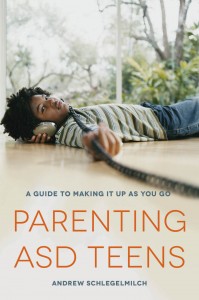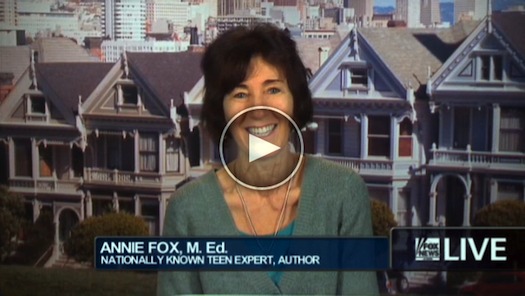|
|
March 17, 2014
 We’re all “making it up” as we go along, aren’t we? It’s been nearly seventeen years since I launched my first teen website (TheInSite). And what I know from the non-stop flow of email questions is that dating is hard for all teens. For teens on the spectrum, who have challenges reading social cues as well as a lower need for attachment and emotional connection than neuro-typical kids, dating can be especially daunting.
Enter Dr. Andrew Schlegelmilch, Ph.D., clinical psychologist who specializes in working with individuals who have Autism Spectrum Disorder (ASD) and their families. He’s also the Head Psychologist at Orion Academy, a preparatory high school for ASD teens in Moraga, California, where, among his other duties, he teaches classes in Sex and Dating. His new book, Parenting ASD Teens will be available in May.
Recently I had the pleasure of interviewing Andrew for my Family Confidential podcast. We talked openly about helping teens with ASD understand sex and navigate their social lives. Listen in here.

July 22, 2011
 Almost ready for my close-up Tuesday morning was not typical. Before 8 o’clock I had my professional act in gear (make-up, hair, couture… such as it is) and took my show on the road. Twenty miles south, David and I pulled up to FoxNews.com’s San Francisco studio and into a parking spot six steps from the front door.
I’d been invited to Fox (no relation) to offer my expert opinion about the choice of some parents to permit their teens to have sex in the family home. What did I think about this trend? Truthfully, I hadn’t heard about it. But I take these assignments seriously so I did my research. Rule of thumb: If you’re going to put yourself out there as someone who knows what she’s talking about, it’s best to try to sound like you know what you’re talking about.
Here’s a 6 min clip of my interview with Jonathan Hunt, a thoughtful interviewer with good questions, a good sense of humor, and good listening skills.

In case you’d rather read than watch the video (though you can do both for the same ridiculously low price… free) here’s the big take-away:
Parents are hard-wired to keep their kids safe. Any hint of a threat to the young ‘un and our inner Mama or Papa Lion instantly reacts. No thinking involved, which is kinda perfect since over-analyzing in an emergency can get in the way of surviving. But not everything parents perceive of as threatening is actually a threat and an over-the-top reaction can be counter-productive. (Like when you encourage your teen to come to you with any questions and when they ask about sex or drugs, you totally freak out thus shutting down all conversation and insuring (s)he won’t be coming back to you with important stuff any time soon.)
Thankfully our brain also specializes in rational thought. The long-term, rational approach to parenting says our #1 objective is to raise a fully functioning independent young adult. That’s why we’ve got to teach our kids to analyze situations. And to make healthy choices. That’s the only way they can keep themselves safe when we’re not around, which is going to account for most of their lives unless you’re planning on having them live with you forever, in which case we need to talk.
Mr. Hunt quoted this statistic: “By their 19th birthday 70% of young people have had sexual intercourse.”
Translation: They’re going to do it anyway, so why not let them do it in the family home rather than a car or in the park, since it’s safer? Or do you think that’s just off-the wall?
There are enough Parent Police out there judging the way other folks raise their kids and I’m not going to join the squad. How you, as a parent, educate your children about sex is a personal decision. But, the reality is; older teens will be doing it.
Wherever you stand on this issue, here’s my advice (again free for the taking):
- Talk about relationships rather than just the “yes” or “no” of teen sex. Talk about sex in context of a relationship, rather than hooking up. If you don’t know where you stand on teen sex or you’re conflicted, that’s honest. Tell your teens that. But remember that you have a leadership role. If you want to transmit your thoughtful values to your teen (as opposed to “Just say no.”) then spend some time thinking about what those values are and why you hold them.
- It’s not just one talk. Have a series of conversations. Treat teens with respect. Talk less and listen more. That’s the only way you can find out where they are coming from, what assumptions they have about relationships, etc. There are endless opportunities to have conversations while you’re watching TV, after a movie, reading the news, listening to song lyrics, etc. It’s very important that the parent’s voice is in a teen’s head. You’re not going to be the only voice in there, but you want to be part of the mix and parental influence is powerful.
- Be realistic. Sex is part of life for adults and for older teens. In the context of a healthy relationship (the only kind worth having) it’s a joy. Parents who are in denial about teens and sex remain silent and their teens remain uninformed. Some people believe that talking to teens about sex encourages them to become sexually active… right now! Just the opposite is true. Studies show that teens whose parents provide them with reliable information actually wait longer to have sex and are more likely to use protection when they do have sex.
At some point, your teen will decide that (s)he’s ready to have sex. You want the decision to be made from a basis of self-knowledge and information coupled with values. You also want that information and those values to come from you. If you don’t talk to your teens about sex and healthy relationships (mutual trust, respect, etc.), where do you imagine they’ll get their information and values from? Probably from their clueless friends. Not a comforting thought.

May 12, 2011
 Didn't sign up for this! It’s spring. Nature’s juices are flowing all around us… and inside us too. If you’re single and wish you weren’t and all that flowing juice isn’t enough to remind you how much you want a bf/gf, let’s add Prom to the mix!
If your top priority is getting a bf/gf , it may seem like your school is packed with lovey-dovey couples. The sight or the sound of them (talking endlessly about each other) may be enough to make you wanna scream, barf or cry.
If you have a bf/gf (w/the added status boost that comes with it) you probably don’t want to lose them. That’s why t(w)eens in relationships often try to ignore the bad stuff and convince themselves things are cool even when that little voice inside screams “I’m not happy!” Your Inner Voice knows you better than Mom. Ignoring its messages rarely helps a situation.
I just got this email from a girl who doesn’t seem to trust her Inner Voice, which is why she turned to me for a second opinion. What do you think of the opinion I gave her?
Hey Annie,
Me and this boy are together but he doesn’t call me and that makes me cry. I need help. What should I do?
Confused
______________________
Hi Confused,
It sounds like you and your bf have different ideas about what it means to be “together.” You’re unhappy because he’s not paying as much attention as you want. Have you talked to him about it? You might say something like, “I want you to call me every day.” (Or however often you think he should be calling.) Of course, telling him straight-up what you want is no guarantee that he’ll change his behavior.
The real question is: Does this guy want to be with you as much as you want to be with him? You deserve that level of interest from a boyfriend… but you can’t force someone to care about you. If he doesn’t want you, dry your tears, move on and find someone who treats you better. If you keep putting up with less than what you want, you’re sending him a message that says, “I don’t deserve any better than this from a boyfriend, so keep on ignoring me and I’ll keep putting up with it.”
If that’s not the message you want him to get, then tell him what you really mean.
I hope this helps.
In friendship,
Annie

September 19, 2010
 David McQueen, The Dave Mack Project You don’t need me to tell you the road gets plenty rough during the teen years, for them and for us. 21st century parents frequently miss opportunities to take the lead and maintain meaningful connections with their tweens and teens. Of course, it’s not all our fault. Teens don’t encourage dialogue, at least not with us! But we can only change ourselves and we need to do a better job when it comes to really listening and trying to understand what’s going on with the young people we love most in the world. Because the lessons of intimacy we teach at home help our kids grow into adults with the confidence to discover who they ought to be.
When we miss those opportunities to connect, it’s not because we don’t care, it’s just that all of us (the kids too) are too busy to check in with each other. Sometimes reminders are needed.
My guest today is David McQueen and he’s here to provide some reminders. David is an educator, international speaker, and blogger extraordinaire. He empowers adults and youth alike on subjects such as leadership, careers and communication skills. Dave is also the founder of The Dave Mack Project, a teen empowerment movement that combines speaking, live events, social media and youth coaching for teens and those who work with teens.
For the last 22 years, Dave McQueen has reached over a million teenagers through live speaking and workshops, on TV and online, with messages of empowerment about inhabiting the present and creating a brilliant future.
Listen to our conversation right here:
[QUICKTIME http://www.anniefox.com/podcast/FC020.m4a 300 300 false true]
If you have iTunes, you can subscribe to this podcast in the iTunes Store.
Or, you can download an MP3 version here.
Upcoming guests include:
Ronit Baras, author of Be Special, Be Yourself for Teenagers
Sean Buvala, author of DaddyTeller: How to be a Hero to Your Kids and Teach Them What’s Really Important By Telling Them One Simple Story at a Time
Dr. Karyn Purvis, co-author (with Dr. David Cross, Wendy Lyons Sunshine) of The Connected Child: Bring hope and healing to your adoptive family
Judith Warner, author of Perfect Madness: Motherhood in the Age of Anxiety and We’ve Got Issues: Children and Parents in the Age of Medication
Katherine Ellison, author of the memoir, Buzz: A Year of Paying Attention

| |
















